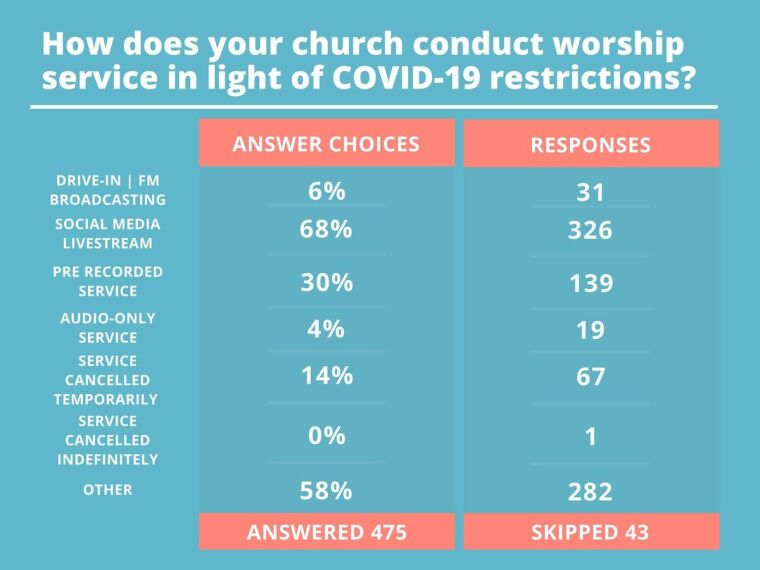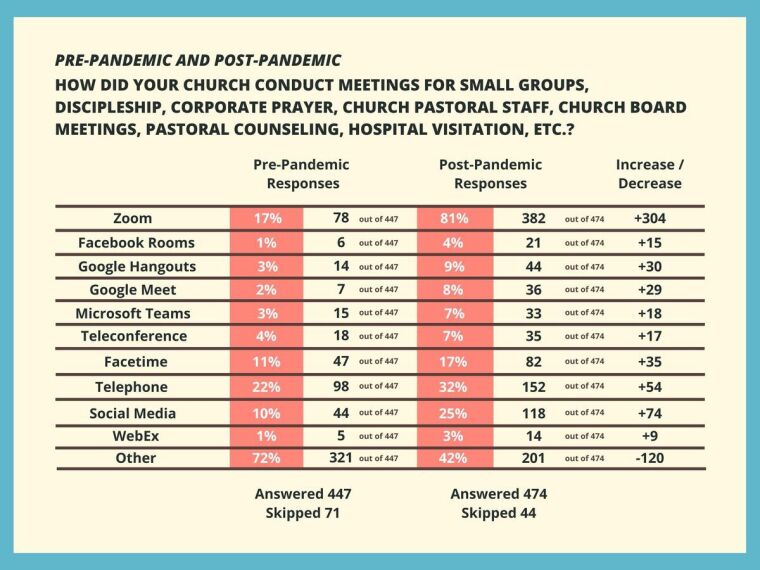Advancing the Gospel in a Pandemic & Post-Pandemic World

In March 2020 the world changed. Churches had to turn on a dime. There was no choice but to adapt to the rising levels of uncertainty, ambiguity, and complexity not experienced since 9/11. The COVID-19 crisis took the world by storm. Planes were grounded. Borders were closed. Businesses were shuttered. And even places of worship shut down. Life as we knew it stalled, and soon citizens in more than 118 countries sheltered in place.
“Pastoral leaders had to move quickly to shift their thinking and approach to gospel ministry while being flooded with a tsunami of daunting challenges in a world turned upside down.”
Pressing questions emerged:
- How can leaders ensure the health and safety of those entrusted to their care?
- How can leaders address the rising unemployment and implications for sustained ministry?
- How should leaders respond to the conflicting national and local directives from political and health officials?
- How do leaders keep their followers unified with many potentially divisive issues?
- How do leaders provide pastoral care for church members in light of new restrictions?
- How do leaders communicate online in biblically, meaningful ways?
As we have worked through these questions over the last several months there is a colossal opportunity we must recognize. Could this global virus be the single greatest carrier of the gospel of Jesus Christ worldwide? In other words, could this be our generation’s divine opportunity for biblical revival leading to personal, spiritual, and organic transformation for unprecedented worship, discipleship, and outreach?
Considering this mindset shift, we asked pastors directly what they believe are the greatest needs essential to keep their ministry thriving in light of the global pandemic. There were four primary needs expressed by over four hundred pastors surveyed representing three conservative evangelical seminaries.
First, these pastors want to learn how to better harness technology for advancing online worship. Second, they recognize the need to reimagine pastoral care in the midst of unprecedented restrictions. Third, they aspire to strengthen their own crisis-leadership readiness. And fourth, these pastors seek to refine their expository preaching skills in light of a multimedia saturated culture.
As we observe, these critical needs have only been intensified in recent months. This research highlights the collective wisdom shared by these surveyed pastors. These highlights are presented to further encourage ministry leaders to motivate church members to advance the gospel in the midst of this global pandemic.
#1. Harness technology for online worship
The first need articulated by the survey participants was that of learning how to harness current and new technology for online and in-person ministry. This included large group worship services as well as small group discipleship across all ages and life stages.
The most common need expressed was in the area of advanced training for implementing technology for online, and in person, socially distanced worship services. In the next section, we discuss the need for small group discipleship and its online trends.
In many regions of the country, churches with excellent Internet access focused on developing fully online worship services, including livestreams via social media platforms (68%) (see table 1). Approximately 139 or 30% of the pastors noted that they prerecord their services and upload them online each week.
As regions have begun to open up, some churches have opted for either outdoor, in-person services or indoor, socially distanced services, coupling their choice with a livestream of the same service.
Some of these churches have invested in a complete remodel of their main worship sanctuary to allow for the best in-person and online worship experiences. However, in rural areas where there is limited technology and Internet access, approximately 6% of churches opted for a drive-in worship service. In these services, members remained socially distanced in their vehicles while tuning into a radio broadcast of the worship service.

These churches delivered recordings of worship services to parishioners who were home-bound and without Internet. What was pleasantly surprising was to see 58% select the other category as noted above. Based on their comments here, each church uniquely customized and adapted their worship services around (a) the unique restrictions of their region, and (b) the contextual needs of their particular congregation. It was encouraging to see how these pastors are leading their churches to innovate and integrate a combination of approaches that move outside of traditional categories for sustainable corporate worship services.

Many of the pastor respondents (75%) agreed or strongly agreed that their ministry’s online services have expanded their outreach (see table 2). Moreover, 71% indicated first-time visitors and unchurched people attended their online services as a result of the pandemic restrictions, and 70% had prepared specific plans for reopening their church once gathering restrictions are removed.
In contrast, only 41% expressed that their ministry has a plan to help first-time, online unchurched visitors integrate into a small group or Bible study. In the days and months ahead, developing a plan for providing accessible pathways for unchurched online visitors to assimilate into the church will be important for sustaining new opportunities for outreach and growth.
The global pandemic forces ministry leaders across the globe to rethink ways in which technology can be appropriated to advance the gospel and continue corporate worship services and other ministries in the midst of significant restrictions.
#2. Reimagine pastoral care
In addition to learning how to harness technology, the surveyed pastors articulated the need to reimagine pastoral care in the midst of unprecedented and ever-changing guidelines. For example, several pastors indicated the challenge of finding ways to shepherd parishioners during major life events such as weddings, funerals, or visitations. Similar to worship services, large group meetings such as weddings and funerals were conducted within size limits given by region or they were also live-streamed. One colleague attended a wedding that was live-streamed. This technology enabled more friends and family to attend than could have been accommodated in person. Guests scattered throughout the United States and internationally took part in the bride and groom's special day.
Pastoral care conducted through personal visitation also had to adapt. For select regions, visitation of those in hospitals and senior community centers remains difficult or impossible. Pastors have overcome these barriers through phone visitation, sending care packages, and providing sermon recordings. Others set up church in residential center parking lots so seniors could participate from their balconies or at their windows. Others hosted drive-by events for children and widows. Still others are more intentionally taking time to teach and train seniors on how to use video conferencing tools for providing pastoral presence.
For those persons unable to use current technology, writing letters to mail and phone calls remain proven ways for meaningful soul care of congregants. One pastor highlighted the importance of “staying connected and helping others connect in an environment that requires isolation and distance.” Another pastor articulated the need to cultivate “unique and creative ways to shepherd people within the bounds of Scripture but in line with current realities.” And yet another acknowledged, “we are having to be very creative in how we keep people engaged while realizing we also have to now always plan for online and in-person gatherings.”
It was remarkable to see such a stark shift in the use of video conferencing for conducting meetings for small group ministry from before and after the pandemic. See table 3 for detailed reference.
One of the most pressing challenges for pastoral leaders is to reimagine a biblically-based, incarnational practice of pastoral presence in such a way that carefully and intentionally stewards traditional methods and novel technology for shepherding the flock entrusted to their care.

#3. Grow in crisis-leadership readiness
There is a third need expressed by the surveyed pastoral leaders. Not only are there needs to learn how to harness technology for online and in person ministry and to reimagine pastoral care strategies, but also a significant need to grow in their character and competency for preparing their own crisis leadership readiness.
If pastors are overwhelmed with the dynamics of the daily challenges or the unexpected crisis—like the global pandemic —it will hinder their ability for creative adaptability in areas of online ministry, pastoral care, and leadership.
Pastors must provide stability, security, and strategic foresight in the midst of significant political and social uncertainty. It is essential to instill hope, foster unity, and, a sense of connectedness through regular communication that encourages, resolves differences, and mobilizes the congregation to pass through uncharted waters.
Instill hope
Some may describe the global pandemic crisis as a really bad kidney stone, saying, “This too shall pass!” However, for all pastoral leaders, it is much more than a crisis to avert or a thing to will your way through. This harsh reality is a powerful opportunity to help the church cultivate a ministry mindset shift, as one pastor requested prayer for “wisdom to shift to an entirely new ministry model.” The only way this is possible is for the pastor to keep grounded in the Word of God, growing in Christlikeness characterized by trust in the Lord’s sovereignty, prayerfulness, patient endurance, and “trusting in God’s faithfulness.”
Foster unity
The church under-shepherds need to promote a “unity of vision for new methods,” especially “in light of conflicting views regarding the pandemic response.” As another pastor highlighted, “people’s grace with one another in a contentious time” is paramount. It seems the high levels of uncertainty have produced a lot of fear, and this fear can contribute to division in the church. Should we wear masks or not? What local and state guidelines should we follow, and which ones should be ignored? Pastors can work to create a culture of dialogue of mutual respect, empathetic listening, and responses that exhibit the fruit of the Spirit. As one pastor quipped, “the greatest need is to try and calm Christians, in light of God’s sovereignty, and remind them that we have nothing to fear, even if we get sick and die.” Instilling hope, fostering unity, and showing, frequent communication to help insulate congregants from further discord is crucial.
Communicate and connect
“People staying connected” seems to be a real challenge for pastoral shepherds in the COVID-19 environment. One survey participant notes, “effectively reaching out to those families and individuals who are not yet comfortable with returning to in-person services” as a key challenge. Another disclosed, “I would like help in planning how to reconnect with members and how to reach out more effectively.” And yet another asserted, “we are having to be very creative in how we keep people engaged.” As pastors, it is vital “to effectively communicate and inspire the church to take initiative in supporting and loving one another.”
#4. Refine expository preaching skills
Pastors are aspiring to learn new approaches to ministry in areas of technology, pastoral care, and crisis-leadership readiness. However, the survey participants also echoed another indispensable need—the need to further refine their own expository preaching skills.
The global pandemic has pushed the ordinary preaching pastor into the world of multimedia and social media public broadcasting in such a way that has never been experienced before in human history.
Today’s pastors not only preach God’s Word to in-person audiences, these pastors now also preach simultaneously to virtual audiences. As mentioned earlier, some pastors no longer have live audiences but only prerecord sermons for digital distribution.
One of the skills preachers need to hone in today’s environment is the ability to clearly communicate. This includes the exegesis, interpretation, application, and delivery of biblical truth in clear, accurate, interesting, and relevant ways that consider the multi-sensory, social-media driven online environment.
Several of the pastor participants emphasized the need for Bible-based preaching, “our greatest need is the same as the need to: ‘preach the word’” (2 Tim 4:2). Another wrote, “We need faithfulness to preach God’s Word.” Said another way, we need to “provide a biblical outlook on our current situation.” Still another asserted, “keep offering relevant teaching,” through “the blessed work of the Holy Spirit in the preaching of the Word.”
These comments among others were a refreshing reminder that no matter what changes in our society, culture, and world, God’s Word never changes. The gospel never changes. The need for broken sinners to find saving faith in Jesus Christ alone never changes. It is an important reminder that we must come back to the basics of Scripture and to teach truth and love well.
Final thoughts
The world has changed in light of this global pandemic. And yet God’s unchanging Word empowers pastoral leaders to courageously grow in areas of technology, pastoral care, crisis-leadership readiness, and expository preaching in order to advance the gospel in new and strategic ways in our pandemic (and post-pandemic) world.
About the Author
Dr. Barfoot aspires to equip and empower global executive, pastoral, and educational ministry leaders who impact the next generation for the cause of Christ. Having served in a variety of pastoral leadership capacities in rural Canadian and suburban Asian and American churches in Canada and the United States since 1992, he has a special heart for leadership development in the local church.
His most recent research surveyed pastors to assess their views on local church ministry in the midst of the global pandemic. He and his wife, Debbie, have three children, David, Joel, and Karissa.
If you want to find out more about Dallas Theological Seminary, please fill in the request information.
This article was previously published in DTS Magazine online. To find more resources, please visit DTS Voice.
Join believers from around the world at one of the most trusted and diverse seminaries and begin your journey of scholarship and service.






